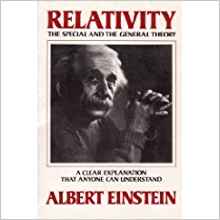-
Relativity; the Special and General Theory
Einstein Albert 1879-1955
Paperback (HardPress Publishing, Jan. 28, 2013)Unlike some other reproductions of classic texts (1) We have not used OCR(Optical Character Recognition), as this leads to bad quality books with introduced typos. (2) In books where there are images such as portraits, maps, sketches etc We have endeavoured to keep the quality of these images, so they represent accurately the original artefact. Although occasionally there may be certain imperfections with these old texts, we feel they deserve to be made available for future generations to enjoy.
-
Out of My Later Years: The Scientist, Philosopher, and Man Portrayed Through His Own Words
Albert Einstein, Henry Leyva
Audio CD (Audible Studios on Brilliance Audio, Jan. 25, 2019)An inspiring collection of essays, in which Albert Einstein addresses the topics that fascinated him as a scientist, philosopher, and humanitarian. Divided by subject matter - “Science,” “Convictions and Beliefs,” “Public Affairs,” etc. - these essays consider everything from the need for a “supranational” governing body to control war in the atomic age, to freedom in research and education, to Jewish history and Zionism, to explanations of the physics and scientific thought that brought him world recognition. Throughout, Einstein’s clear, eloquent voice presents an idealist’s vision and relays complex theories to the layperson. Einstein’s essays share his philosophical beliefs, scientific reasoning, and hopes for a brighter future, and show how one of the greatest minds of all time fully engaged with the changing world around him. This authorized Philosophical Library audiobook features never-before-seen documents from the Albert Einstein Archives at the Hebrew University of Jerusalem. “Ethical axioms are found and tested not very differently from the axioms of science. Truth is what stands the test of experience.” - Albert Einstein, “The Law of Science and the Laws of Ethics” Albert Einstein (1879–1955) was born in Germany and became an American citizen in 1940. A world-famous theoretical physicist, he as awarded the 1921 Nobel Prize for Physics and is renowned for his Theory of Relativity. In addition to his scientific work, Einstein was an influential humanist who spoke widely about politics, ethics, and social causes. After leaving Europe, Einstein taught at Princeton University. His theories were instrumental in shaping the atomic age.
-
Out of My Later Years
Albert Einstein, Henry Leyva
MP3 CD (Audible Studios on Brilliance Audio, Aug. 30, 2016)An inspiring collection of essays, in which Albert Einstein addresses the topics that fascinated him as a scientist, philosopher, and humanitarian. Divided by subject matter - “Science,” “Convictions and Beliefs,” “Public Affairs,” etc. - these essays consider everything from the need for a “supranational” governing body to control war in the atomic age, to freedom in research and education, to Jewish history and Zionism, to explanations of the physics and scientific thought that brought him world recognition. Throughout, Einstein’s clear, eloquent voice presents an idealist’s vision and relays complex theories to the layperson. Einstein’s essays share his philosophical beliefs, scientific reasoning, and hopes for a brighter future, and show how one of the greatest minds of all time fully engaged with the changing world around him. This authorized Philosophical Library audiobook features never-before-seen documents from the Albert Einstein Archives at the Hebrew University of Jerusalem. “Ethical axioms are found and tested not very differently from the axioms of science. Truth is what stands the test of experience.” - Albert Einstein, “The Law of Science and the Laws of Ethics” Albert Einstein (1879–1955) was born in Germany and became an American citizen in 1940. A world-famous theoretical physicist, he as awarded the 1921 Nobel Prize for Physics and is renowned for his Theory of Relativity. In addition to his scientific work, Einstein was an influential humanist who spoke widely about politics, ethics, and social causes. After leaving Europe, Einstein taught at Princeton University. His theories were instrumental in shaping the atomic age.
-
by Albert Einstein AuthorRelativity: The Special and the General Theory
Albert Einstein (Author)
Unknown BindingRelativity: The Special and the General Theory by Albert Einstein (Author)
-
The World As I See It
Albert Einstein, Alan Harris
Paperback (WISDOM, )THIS IS THE AUTHORIZED ENGLISH TRANSLATION!! You thought he was all math and equations, didn't you? But as you may expect from someone whose professional role is to explain what is real, what is unreal, and how the universe works, Einstein was deeply involved in philosophy and metaphysics. The World As I See It is a collection of essays, articles and letters that reveal the other side of the physicist: the advocate of a world of peace and mutual helpfulness. 'What is the meaning of human life, or of organic life altogether?' he begins. 'To answer this question at all implies a religion... But from the point of view of daily life, without going deeper, we exist for our fellow men...'
-
Relativity: The Special and General Theory by Albert Einstein
Albert Einstein
Hardcover (Signature Press, March 15, 1717)None
-
Relativity
Albert Einstein
None
-
Relativity - The Special and General Theory
Albert Einstein
Paperback (CreateSpace Independent Publishing Platform, Aug. 20, 2017)Revised edition: 1924 (note: images are not included in this eBook.)
-
Relativity: The Special and the General Theory
Albert Einstein
Paperback (Independently published, Feb. 2, 2020)elativity: The Special and the General Theory began as a short paper and was eventually published as a book written by Albert Einstein with the aim of giving an exact insight into the theory of relativity to those readers who, from a general scientific and philosophical point of view, are interested in the theory, but who are not conversant with the mathematical apparatus of theoretical physics.
-
Relativity : the special and general theory
Albert Einstein, Robert Lawson
eBook (, Jan. 25, 2020)This book was published in 1920. This book intends to give an exact insight into the theory of Relativity to those readers who, from a general scientific and philosophical point of view, are interested in the theory, but who are not conversant with the mathematical apparatus ' of theoretical physics. The work presumes a standard of education corresponding to that of a university matriculation examination, and, despite the shortness of the book, a fair amount of patience and force of will on the part of the reader.
-
Relativity: The Special and the General Theory
Albert Einstein
Paperback (BN Publishing, May 23, 2020)After completing the final version of his general theory of relativity, Albert Einstein wrote a book about relativity for a popular audience. His intention was "to give an exact insight into the theory of relativity to those readers who, from a general scientific and philosophical point of view, are interested in the theory, but who are not conversant with the mathematical apparatus of theoretical physics." The book remains one of the most lucid explanations of the special and general theories ever written. In the early 1920s alone, it was translated into ten languages, and fifteen editions in the original German appeared over the course of Einstein's lifetime.
-
Relativity: The Special and General Theory
Albert Einstein
MP3 CD (IDB Productions, Jan. 1, 2019)Relativity: The Special and General Theory PART I THE SPECIAL THEORY OF RELATIVITY PHYSICAL MEANING OF GEOMETRICAL PROPOSITIONS In your schooldays most of you who read this book made acquaintance with the noble building of Euclid's geometry, and you remember -- perhaps with more respect than love -- the magnificent structure, on the lofty staircase of which you were chased about for uncounted hours by conscientious teachers. By reason of our past experience, you would certainly regard everyone with disdain who should pronounce even the most out-of-the-way proposition of this science to be untrue. But perhaps this feeling of proud certainty would leave you immediately if some one were to ask you: "What, then, do you mean by the assertion that these propositions are true?" Let us proceed to give this question a little consideration.